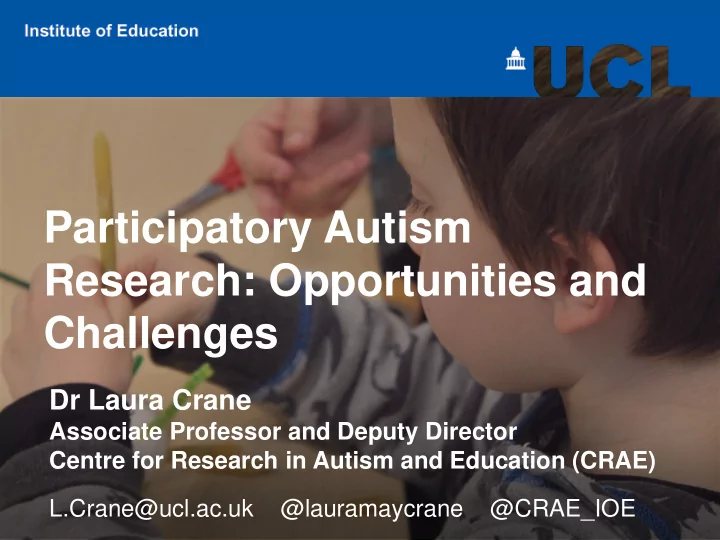

Participatory Autism Research: Opportunities and Challenges Dr Laura Crane Associate Professor and Deputy Director Centre for Research in Autism and Education (CRAE) L.Crane@ucl.ac.uk @lauramaycrane @CRAE_IOE
Centre for Research in Autism and Education (CRAE) – Our Mission • Conduct high quality scientific research that has a positive impact on the lives of autistic children, young people and adults • Meaningfully engage with the autistic and broader autism communities to shape the future direction of autism research
Dramatic rise in autism publications ...but still a huge ‘translational gap’
A Future Made Together To describe the current landscape of UK autism research To compare the nature of research with the views and perspectives of the autism community To understand the nature and extent of community involvement in research
A role for participatory research?
Research questions How do young autistic people interpret “normal” mental health? Does a person’s “normal” change when they are experiencing mental health problems; if so, how? What are young autistic people’s experiences of accessing support for their mental health problems?
Participants - eligibility 16 to 25 years of age Have received a formal diagnosis of an autism spectrum condition Be living in England
Participants and Methods Online survey (n=109) Semi-structured interviews (n = 21) Limited our sample to those with good spoken or written language – unsurprising that many in our sample were diagnosed with Asperger syndrome, had gained educational qualifications, and were currently in employment/education
Survey – key findings 1) ‘Normal’ is negative for young autistic people 2)High rates of mental health problems 3)Poor mental health literacy
1) ‘Normal’ is negative for young autistic people Strikingly high rates of young autistic people reporting that they were feeling … Unhappy and Unable to overcome Under strain depressed difficulties Unable to face Lacking in Worthless up to problems confidence
2) High rates of mental health problems
3) Poor mental health literacy How does “normal” mental health change when experiencing mental health problems? Unhappy and Unable to overcome Under strain depressed difficulties Unable to face Lacking in Worthless up to problems confidence
Know Your Normal Toolkit Download for free at www.knowyournormal.co.uk
Interview results – four themes 1) (Not) understanding my “normal” 2)Stigma 3)Barriers to support 4)Trusting relationships
1) (Not) understanding my “normal” Many young autistic people were unsure whether the difficulties they were experiencing were due to their autism or their mental health problems
2) Stigma Autism Mental health
3) Barriers to support Lack of available services Delays Not tailored to individual needs No other options available Disjointed services Poor transitions
4) Trusting relationships “What I’d like is someone I can trust, someone to talk to, and someone who understands autism; a professional person”
Recommendations • More initiatives to reduce stigma of autism and mental health • Increased training for professionals • Greater autistic involvement in service design and delivery
‘Early career’ and ‘established’ researchers’ views on participatory autism research
Participatory research is…? Growth of participatory research It “makes me do better science” But what actually is it? What ‘counts’?
Need for support… Barriers and challenges Need (1) good mentoring, (2) development of more trusting relationships with autistic co-researchers How do I start? (need for templates/exemplars)
Working in partnership www.shapingautismresearch.co.uk
Coming soon… The Research Passport
Thank you!
Thank you for listening Dr Laura Crane Senior Lecturer and Deputy Director Centre for Research in Autism and Education (CRAE) L.Crane@ucl.ac.uk @lauramaycrane @CRAE_IOE
Recommend
More recommend